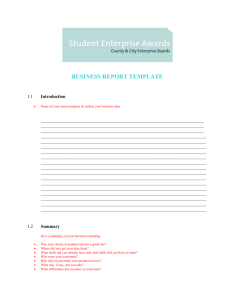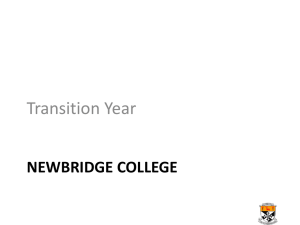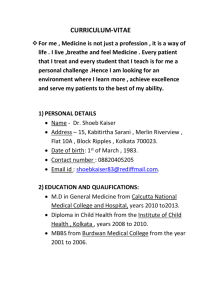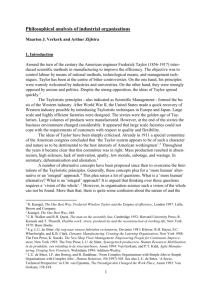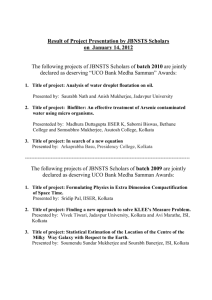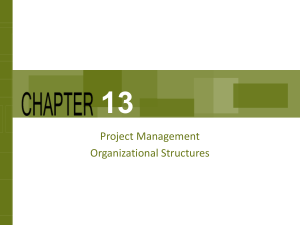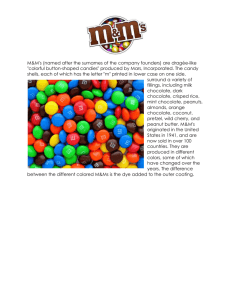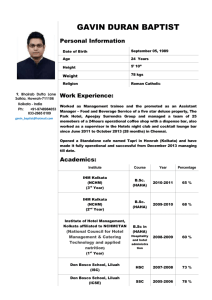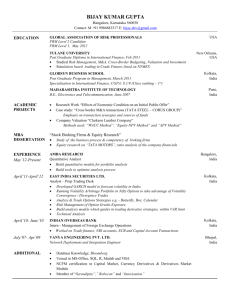Information for TY Mini-Companies
advertisement
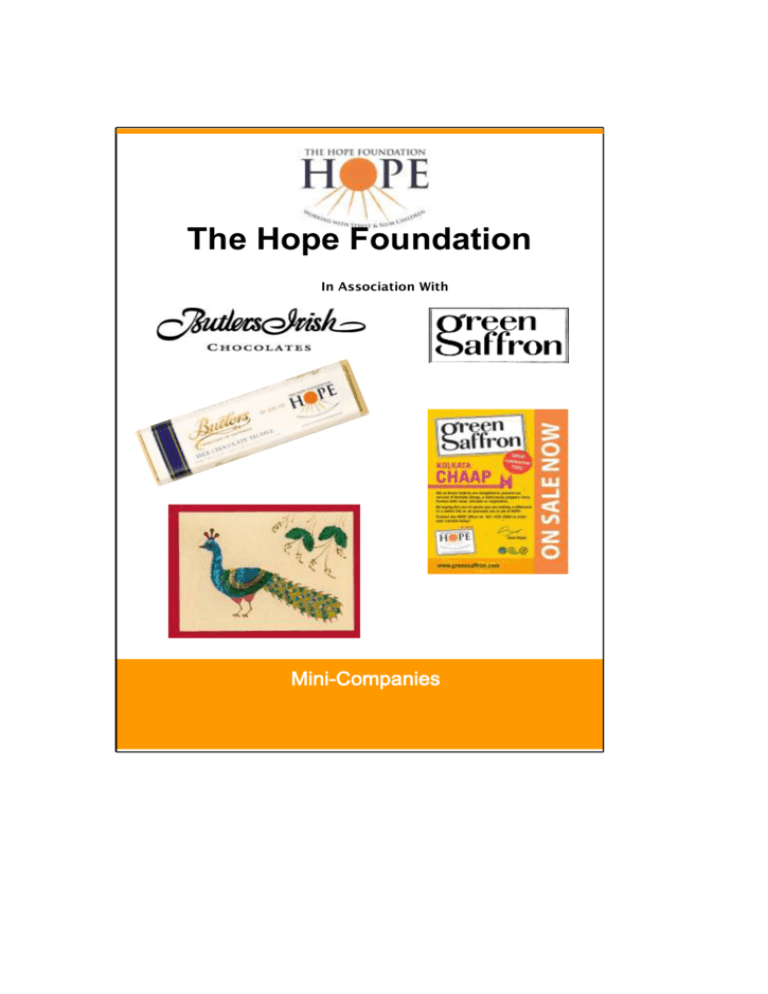
The Hope Foundation In Association With Start-up Information for Transition Year Mini-Companies TY Mini Company Initiative The Hope Foundation is a Cork-based charity which works with street children of Kolkata, many of whom are your age, and younger. We need to raise as much money as possible to improve the lives of thousands of children who are currently under our care. The more money your school raises, the more children we can help! Below we have some guidelines, which we hope will help in the running of your mini-company. This is a hands-on introduction for you to the world of business and marketing. By getting involved in the area of fundraising, you will gain useful experience in setting up and running a small enterprise. This exercise will provide your mini-company with an opportunity to use your own experience and judgement in creating an enterprise that is unique to you. You will be actively involved in the ‘who’, ‘what’ and ‘how’ of your enterprise, and will ultimately be responsible for its success. There are three stages to launching a mini-company or new business idea: 1. Getting the idea 2. Preparing a plan 3. Starting up. The idea and products have been provided including HOPE hand-made cards from projects in Kolkata, Butlers Irish Chocolates and Green Saffron so what you need to do is prepare a plan to sell as much chocolate or Kolkata Chaap mix as possible and start-up your mini-company. There are some key attributes that will help in the success of your mini-company. Students must have, or develop, the following attributes: Belief in the project and mini-company Determination to succeed Self-confidence Persistence & Resourcefulness To ensure that you have a good mixture of these attributes, it is best that you form groups rather than attempt this on your own. Experience shows that small teams work best, but your teams should be organised in such a way that there are enough individuals to carry out the various tasks necessary to run a successful enterprise. How...Who...What... 1) The first job is the allocation of tasks and activities; this should be done in such a way to make best use of the different talents and skills of each individual in the team. A good combination of individual talents makes a successful team, and therefore a successful business. A list of positions should be circulated within your group, and team members vote on the nominees. These positions will include Chairperson, Secretary, Treasurer and other relevant positions. You should find out what each job entails before voting for the person to fill each role. It should not be a popularity contest, but should be assessed on what you consider to be the person’s best talent; for instance, if one person is good at maths, they may be a good candidate for treasurer. Once this process is completed, each team member will have been delegated his/her specific task. This allows for efficient organisation within the group; each member has a role and is aware of what that role entails. Each team member should be willing to give the running of the mini-company their best shot and really want it to work. Due to the fact that all minicompanies and schools are selling the same product, your group needs to use its imagination to stand out from the others. 2) It is then a good idea for your group to gather relevant information about the Hope Foundation. This would include researching The Hope Foundation web sites: www.hopefoundation.ie (Hope Ireland site), and www.hopechild.org (Hope India Site), and making up a portfolio of information and pictures to show potential customers. This makes your mini-company look and feel professional and will teach you about the importance of marketing your product. It also makes your mini-company an integral part of the ongoing fund-raising drive for the Hope Foundation. 3) Once the group has been formed, the roles delegated and research gathered, it is very important that your company identifies who its customers are. Customers could include: School friends Teachers Parents Relations Neighbours Local Businesses, etc. Selling a product like a chocolate bar is quite easy, as it has wide customer appeal. Therefore, the chocolate could be targeted at practically everyone you can think of. 4) Next, your team should meet as a group, to bounce ideas off each other, which will assist in the development of the group dynamic. It is a good idea to meet regularly and come up with possible new opportunities with selling potential. Opportunities could include: School activities - school plays, fashion shows, parent teacher meetings, school open day, etc. Significant Occasions - Christmas, Valentines Day, Mothers Day, Easter, etc. Large neighbourhoods. Hold a HOPE day in your school - your mini-company can sell to teachers and students in all years. Local offices and businesses - many offices have no vending machines. Local Shops - may sell the chocolate in their shops and collect the money for you. Local activities - car boot sales, bring and buy sales, local sports games, parades, etc. N.B. Don’t forget to check with your local police station to see if permits are needed! It is also necessary to get a broader perspective and ask outsiders for their opinions – this is very important, as many of these people are potential customers. Groups must keep their eyes open for gaps in the market and take advantage of these. Don’t forget to ask for assistance if you are having problems. 5) It is very important that your mini-company is run along the same lines as a real business and that everything is recorded. This ensures a smooth running business. Most importantly, your minicompany should keep accounts and one person should be in charge of these accounts. This person should take note of every bar or packet sold and record the money, which should be kept somewhere safe. It is vital that all products are accounted for, because we must receive the money for each bar and packet that were sent to your school. The first collection of money will be before your school finishes up for Christmas. All the money that has been collected for the bars and packets sold at that stage must be sent into The Hope Foundation at: Silverdale Grove, Ballinlough, Cork. All products not sold by Christmas can be kept and sold when you return after the holidays. The next collection will be made in February and the final collection in April. You will receive a receipt after each collection for your records. If all products have been sold at any stage, we will happily send you more bars and packets if you wish to continue. 6) An effective marketing strategy is essential to the success of your mini-company. The more efficiently your product is marketed, the more bars and packets you will sell. As your mini-company has been provided with the products, marketing is your primary concern. The strategy you adopt should reflect your groups’ resources and environment. You should adopt the marketing principles outlined on the next page to make your product attractive in the eyes of the consumer, remembering that you will be offering your product to people of all ages and backgrounds. The Marketing Mix One of the most basic concepts of Marketing is the 4 P’s, which stand for Product, Price, Place, and Promotion Product: The instant recognition of Butlers Irish Chocolate by the public as a quality confectionery product will give your mini-company an advantage when beginning your marketing strategy. Green Saffron is also recognised as a local enterprise which is well respected so it can also be marketed as a local Irish product. You are entering a wellestablished market place and selling a product that has mass appeal. Price: Due to the unique nature of the project, you have the option of charging a premium price for your product. This is because the proceeds of all sales go to the Hope Foundation and its fundraising projects in Calcutta. The customer is getting a quality product, along with the satisfaction of helping a worthwhile cause. The amount that the Hope Foundation will collect for each bar is €2, but your mini-company has the option of charging more than this amount and keeping the profits. The packets of Kolkata Chaap are sold for €3. The packets of HOPE hand-made cards come in a pack of two and cost €1.70 and can be sold at a price designated by you. Do not abuse this however, as people tend to know if they are being overcharged excessively for something, and will not believe that they are getting value for money. Place: You should examine and decide on the best method of distributing your product. This can take many forms, including those mentioned on the previous page. It is up to your group to decide which is best for you; this will depend on your area and the resources available to you. Promotion: Your mini-company should focus on the best way to sell the product and link this with the Hope Foundation. You can achieve this by selling the idea that the customer is helping a very worthwhile cause. The combination of Butler’s and Green Saffron’s reputation and the fact that all proceeds are going to charity gives your mini-company a readymade promotional strategy. It is up to you to examine the market place and implement a marketing drive to suit your location. Implementing Strategy 7) When you have developed a marketing strategy, you need to implement it. Your group now has the task of running an enterprise on a day-to-day basis, with all the responsibilities that this entails. Awareness of your role and the roles of others in the company is crucial to your success. Your mini-company should meet on a regular basis to hold progress meetings. At these meetings you should examine your strategy, review results to date, discuss new marketing ideas and examine how well the company is being run. Changes should then be made if necessary, making sure to keep a record of everything. Remember, YOU determine the success of your enterprise, and you should take advantage of the resources available to you, e.g. marketing websites, libraries and the assistance of others, such as teachers, parents and your peers. It is a good idea to examine various aspects of running a small enterprise and ask any questions that are relevant to the project before you start if possible. If successful, your mini-company will have learned the importance of teamwork, setting goals and achieving them. You will also have the satisfaction of knowing that you have contributed towards making a difference in the lives of the children of Kolkata. Good Luck! We wish you the best of luck in running your mini-company, and we hope you will learn a great deal from taking part. As you know, two representatives from the winning chocolate-selling school will be taken to Calcutta to bring back first-hand accounts to the rest of the schools in the country of what their fundraising has done to help the street children of Calcutta. Thank you again for all your help and best of luck with your minicompany! All at the Hope Foundation Contact us The H o p e F ou n da ti on Head Office - Ireland: Silverdale Grove, Ballinlough, Cork Phone: 021-4292990 Fax: 021-4293432 Email: office@hopefoundation.ie Web: www.hopefoundation.ie India Office: 39 Panditya Place, Kolkata 700029, West Bengal, India Phone: +91-33-24742904 Fax: +91-33-24542007 Email: info@hopechild.org Web: www.hopechild.org / www.hope-foundation.in
